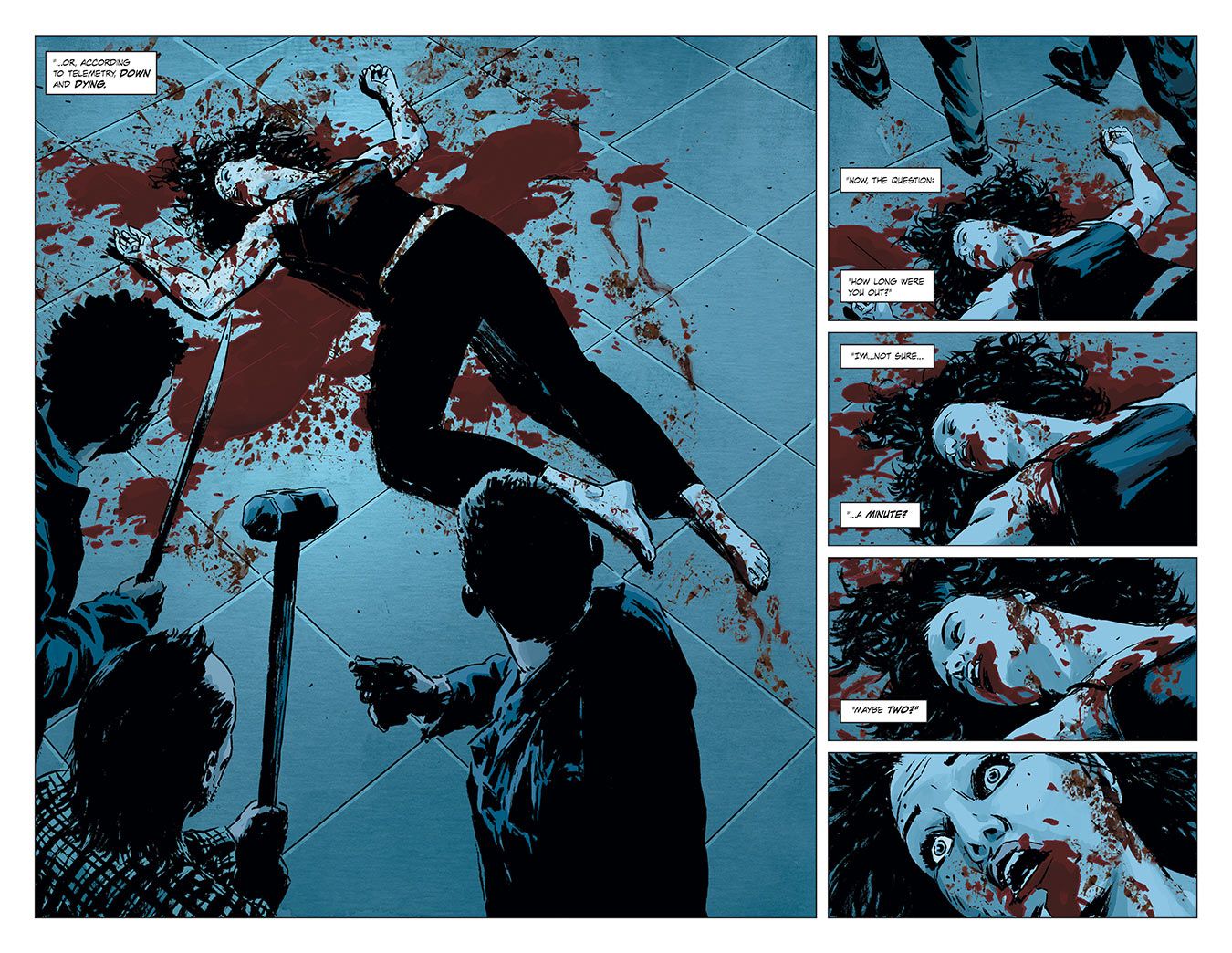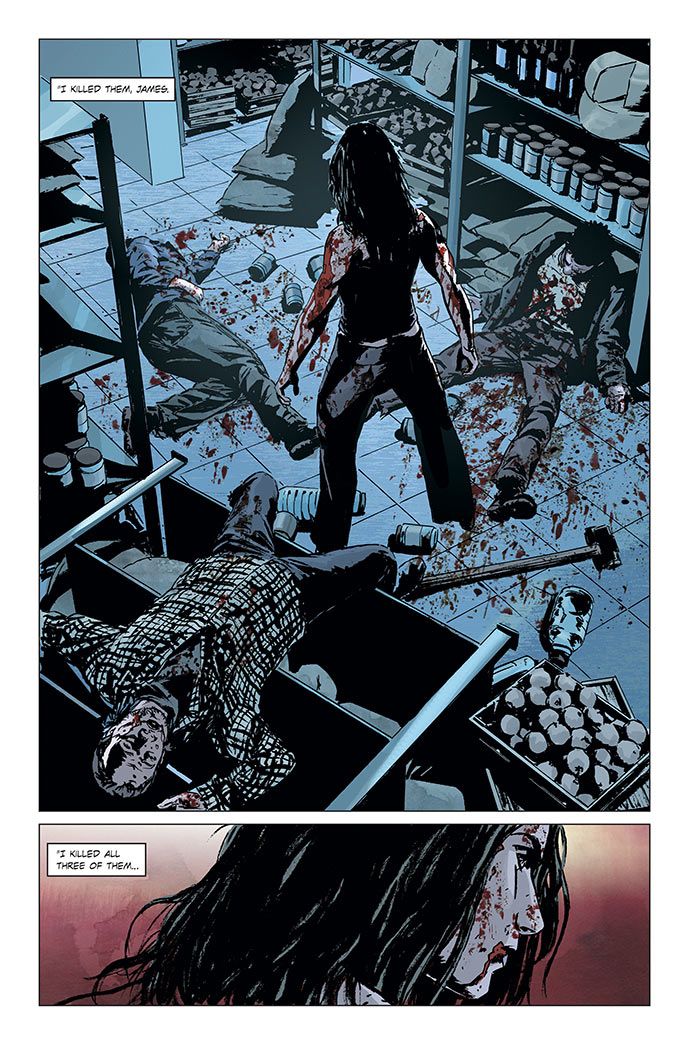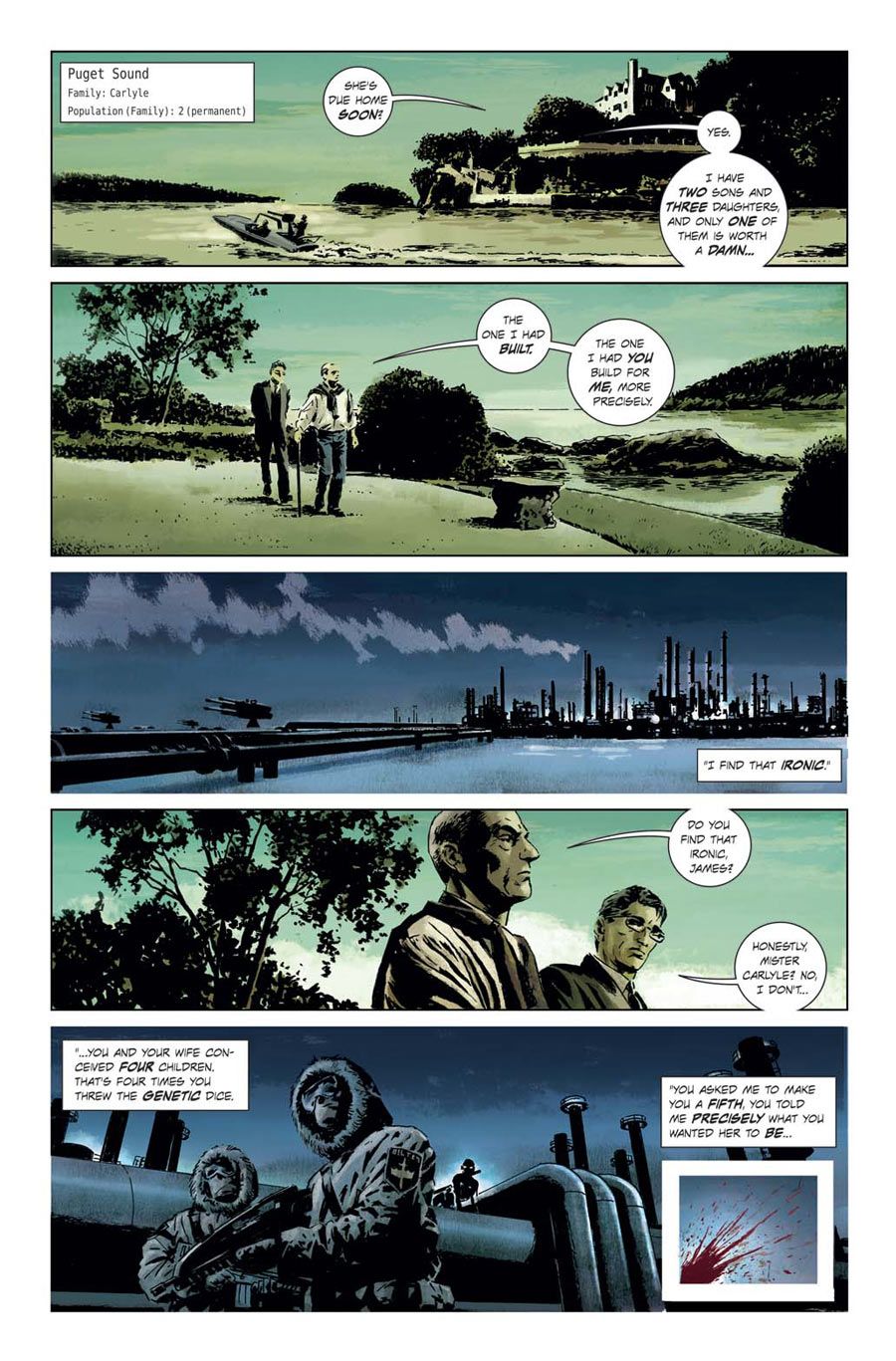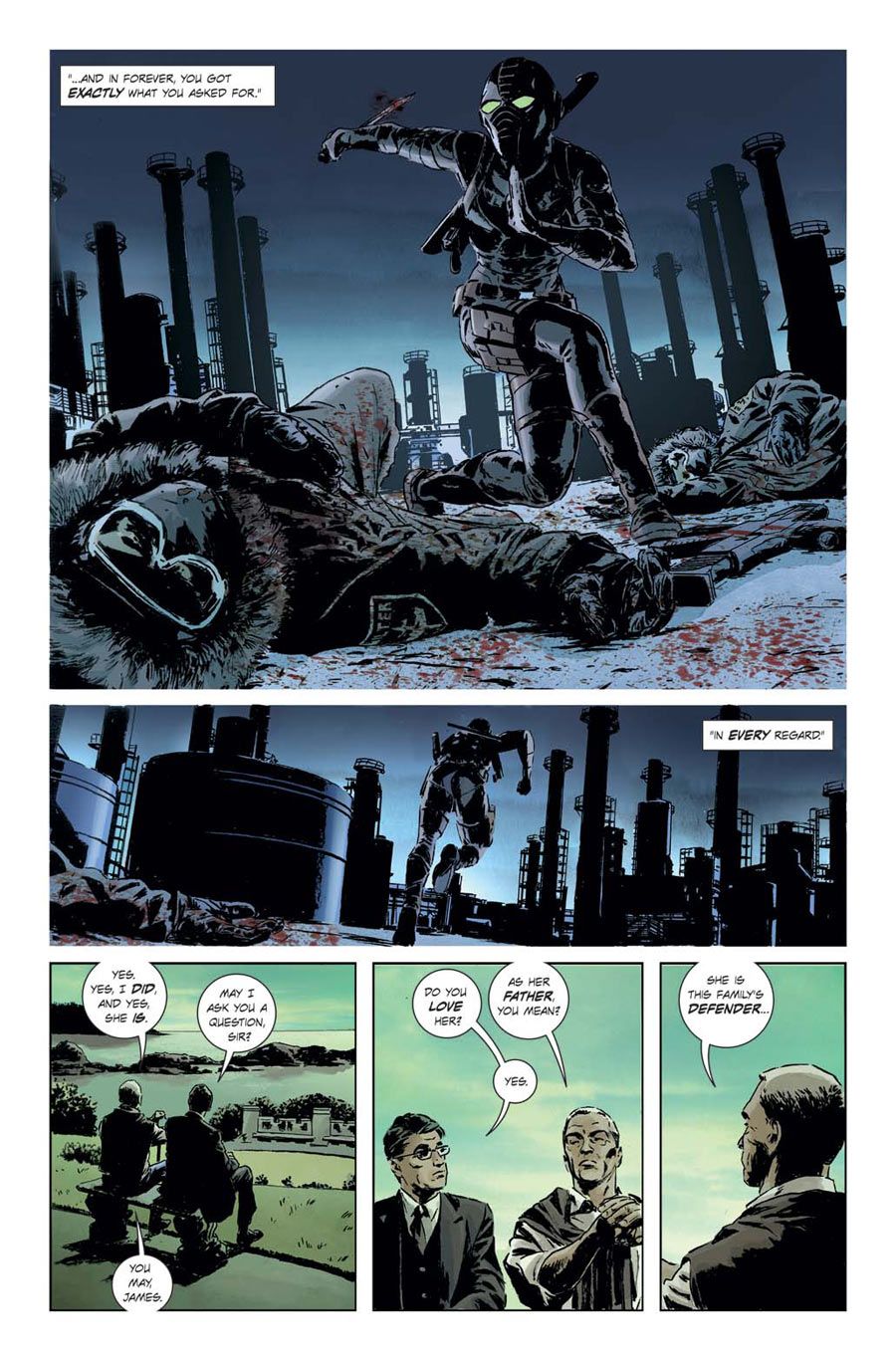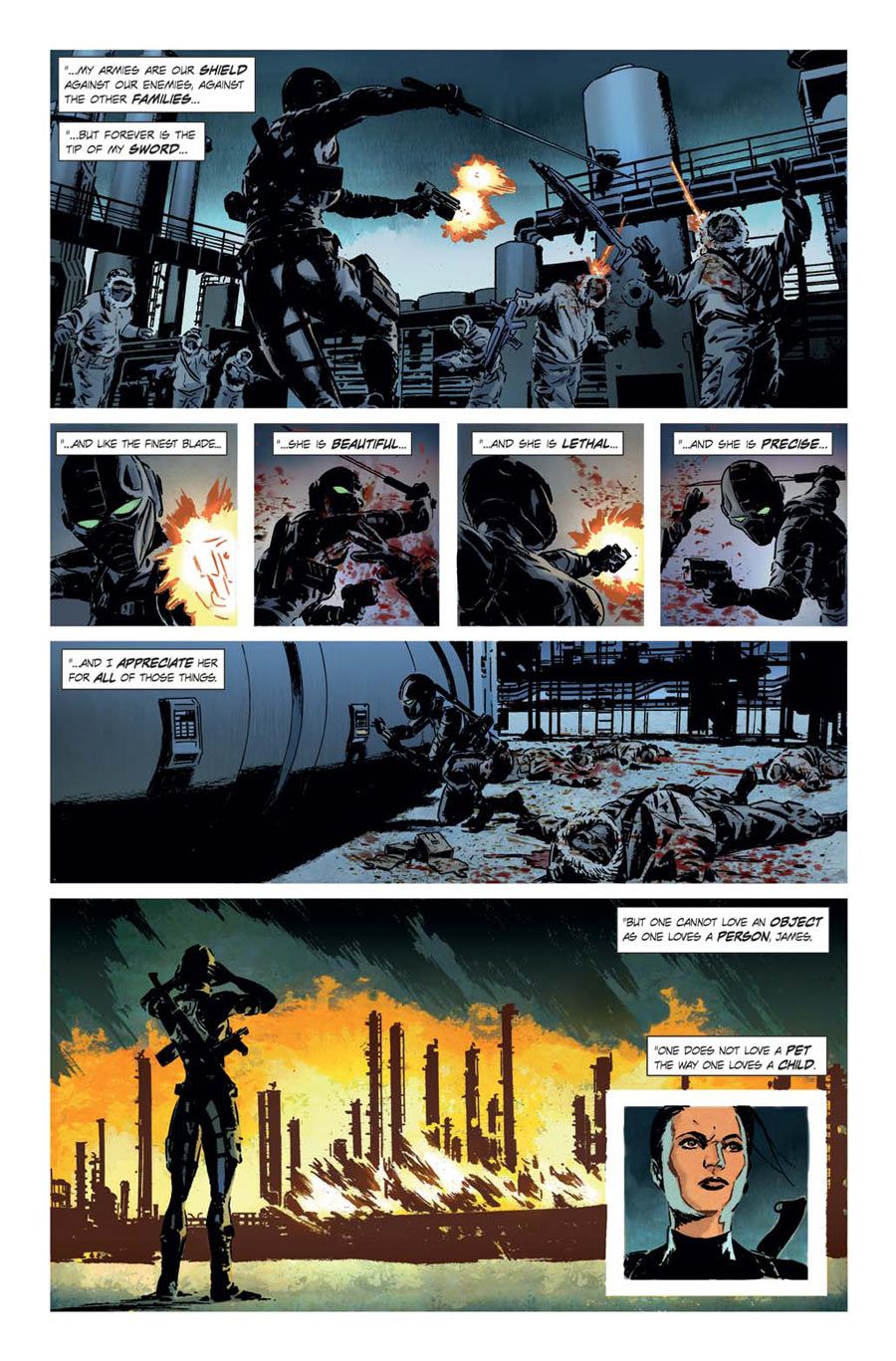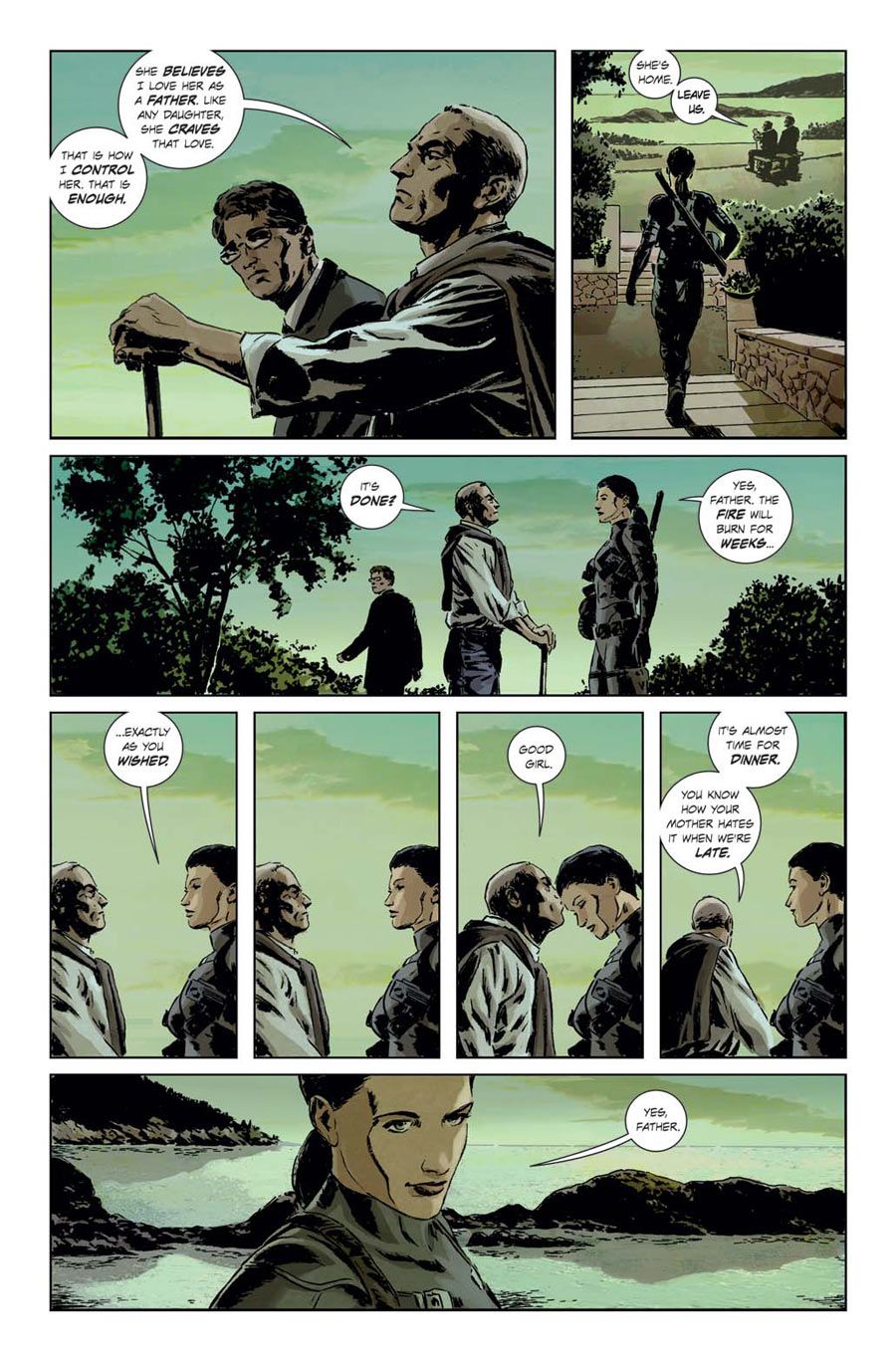The writer of everything from "Gotham Central" and "The Punisher" to "Queen and Country" and "Stumptown," Greg Rucka has worked at DC Comics, Marvel and Oni, but his next big book is coming from Image Comics. Joining forces once again with frequent collaborator Michael Lark, the two are building the post-apocalyptic world of "Lazarus" from the ground up.
"Lazarus" takes place a few decades in our future, after the greatest financial depression of all time essentially wiped out government on a global scale. Instead of states or countries, the world is now broken up into territories run by families. If you're not a part of a family, you fall into two categories: Serfs and Waste. Serfs serve some sort of function, while Waste simply exists. The Carlyles runs much of what used to be the United States' west coast, and like every other major family on the planet, have one very important member, a Lazarus, who acts as their chief warrior in any given conflagration between territories.
"Lazarus" focuses on Forever Carlyle, her family's defender and a woman surrounded by many secrets yet to be revealed to her. The series, which will be presented in arcs with month-breaks between them, "Saga"-style, finds Forever traveling, experiencing new things and, more importantly, questioning her place in the world and her family.
During a recent conference call, Rucka talked about everything from Forever's relationship with her family and her specific power set to her gender and the genesis of the series.
"We've been describing it as sort of 'Godfather' meets 'Children of Men,' but that's a little disingenuous," Rucka said. "We've used the phrase 'dystopian future,' but that's a little tired. The idea behind the series is, like they used to say on 'Max Headroom,' 'Twenty Minutes Into the Future' -- but it's further than that.
"It's a world that has suffered a huge economic collapse, where the rich and the poor are incredibly divided, where there's very few of the rich and there's lots and lots of the poor. Wealth has become the truest instrument of power, and they'll do almost everything they can to keep it. In this world is Forever Carlyle, who is the quote-unquote youngest daughter of the Carlyle family. She is sort of their, I don't want to say secret weapon, but she is the standard bearer for the family's defense.
"As a result of that she's the recipient of everything the family can offer. The Carlyles' wealth and power initially came from the agricultural business and that has lead to genetic modification and that has lead to gene work with people. Every family has either a Lazarus or a similar force -- it is a title. It is a slang term for this type of person, this individual who is the bloody sword and fire and shield for their family. So that's it, in kind of a nutshell. Forever's story, of course, is that she's not who she thinks she is and it is in many ways a journey of self discovery."
Part of that journey includes Forever potentially discovering that she's not a true member of the Carlyle family in the traditional sense of the word, something Rucka says comes into play as the series progresses.
"Forever has been raised to believe that she is a biological daughter, but she's not," Rucka said. "How she was made is a mystery to her, and there is a sincere concern that should she ever find out the truth behind her creation, they would lose control of her. So, there's actually active deception.
"We did that four page prelude story, and it was a three character story: Her father Malcolm talking to the lead scientist who monitors and maintains her, because she has to be maintained -- she has a maintenance schedule, effectively. At the same time, we're watching Forever off doing daddy's dirty business. Her father tells James, "She believes she's my daughter. She believes that I love her, and that is how I control her." Obviously, one of the immediate tensions is, when is that going to break? How long can you maintain this deception? Different people within the family have different agendas with regards to her. They want to control her, they want to use her for their own ends."
As Malcolm also explained in the preview, while the Carlyle family's army is the shield, Forever is the sword and a sword needs to not only be properly built but correctly honed.
"The biggest ability is -- and this semi-consistent to the other Lazari from other families -- is that she's very hard to kill," Rucka said of Forever's advanced skills. "She's not immortal, but her ability to recover from injury is a level of technology that's almost indiscernible from magic. I did a lot of research on this and a lot of speculative extrapolation on it. It's a leap from where we are going, but it's not an impossible leap. That's essentially her primary strength, that you really can't stop her. That right there is a problem. On top of that, you have the exact kind of genetic engineering you would expect if you were going to put this into your warrior/bodyguard/soldier/spy. She is very quick, she is very strong, she has a variety of resistances and immunities, all of which arise from a genetic level. It isn't, 'I'm going to lift a car and throw it,' but it is a high, upper-end human spectrum ability."
Rucka went on to explain that he looked into research about genetically modified athletes and how you need to beef up existing body systems in order to make up for more muscle mass, an idea that made its way into his story.
"You can take all that [genetic modification], but if you put a sword in somebody's hand with that ability, they might be able to swing it really hard, but it doesn't mean they're going to hit what they're swinging at," Rucka said. "So, she has been raised from the beginning and trained from the beginning to do certain things. More importantly -- or just as importantly -- she's been raised to believe certain things, like that the family is correct, that the peasants, or Waste as they're called, do not matter to the family, that her father is always right. That's both conditioning as a product of nurture but it's also in her design, it goes into her maintenance schedule."
When it comes to actual threats, those generally come from the other families trying to exert control. As the family's sword, Forever is wielded with an eye towards dismembering without destroying the territory.
"In theory the ultimate purpose of a Lazarus is to destroy the enemy of the family," Rucka said. "To do that you need to be able to destroy the other family's Lazarus. Since so much of what's driving the wealth of this world is about greed and possession, the ideal conflict is one that retains infrastructure and retains material. 'I don't want to bomb your city, I want to take your city, so I want to chop off the head. There's no point in my destroying the people, especially if your people don't matter to you. My goal is I'm going to take you out.'
"There's an aspect through that upper level political-slash-military conflict that she should be able to act well on a battlefield, but she should just as easily be able to survive in very specific assassination operations or one-on-one combat. It's not a world of monsters per se, but some of the people are definitely monstrous. Certainly, at the start, the conflicts she finds herself involved with are with people of meat and bone."
The writer was a bit wary of giving away too much when asked about the extended cast of characters Forever will be dealing with, but did give a good run down of her siblings.
"This is a large family, so her siblings, her parents, all play a part," Rucka said. "She's got her dad, two older brothers Stephen and Jonah. Jonah has a twin sister Johanna and then she has another older sister Bethany. All of them have very specific agendas and opinions regarding Forever. Michael and I have been talking a lot about this lately, [but] her mom we're holding in reserve. When her mom appears, that's actually a story point for her, for lack of a better phrase, her presumptive mom as opposed to her biological mom.
"Her relationships with the family are all power relationships. She is not a servant, but she is always aware of her place in the family. Some do a better job than others of interacting with her. For instance, Bethany worked with James to create her. Forever doesn't know this and doesn't understand why Bethany has this particular interest in when she takes her pills or why she's always getting check-ups from her sister other than that's the thing Bethany does. Bethany's focused on the sciences. Her relationship with James is far more intimate. One of the ways they control her is the withholding and granting of affection and approval. There are very few relationships she has within the family structure that are not dictated by that."
Part of the mythology of the series revolves around Forever and not only how she was created, but why. Rucka points out that her father was very specific when designing his Lazarus as a woman.
"The families are conservative by nature," he said. "There's a certain amount of sexism in them. There is a huge vanity in naming your child Forever, you know? Malcolm got what he ordered. He had a checklist and there was very much a sense of controlling her through that "daddy's little girl" thing. It is, ironically perhaps, among certain families, that element of sexism is still extent and practiced but in many ways it's like our sexism which tends to be a cultural one. Down amongst the Waste, there's really no time for it. These are people are desperately trying to survive and desperately trying to find their way out of this horrible poverty they live in. Issues of gender amongst the Waste are far less crucial. Forever is as she is by design and that means she's a woman by design. Once you get into the second arc you see -- I'm trying to figure out how to phrase this because this is kind of spoilery -- you see more evidence of how Malcolm manipulates his daughter and how long it's been going on and how that "daddy's little girl" relationship really factors in to everything."
Later issues will take Forever away from her family, however, and those experiences will help inform the new worldview she's developing.
"I don't think this is a spoiler, but in the third issue she's been sent to another family at her father's request to engage in negotiations," Rucka said. "When she arrives, she is interacting with their Lazarus, a man named Joacquim, and that relationship is entirely different, not as adversarial as one might presume. Part of what the story is is actually how her experience with other people outside of this rigid structure she was created in leads to more questions and her growth and the way she changes. I've been having a lot of fun with the whole book, frankly. It is right now the book that I want to be working on when I'm working on other things for the most part, which I take as a good sign."
On the subject of worldbuilding and presenting information to the audience as they go, Rucka said he prefers storytellers who let you know bits and pieces as the story progresses.
"I think one of the things that we've done successfully in the first arc, in these first four issues, is to sort of paint the world broadly and paint the sort of political tensions, the power balance of the world," Rucka said. "We do not have a lot of opportunity in these first four issues to really go down amongst the people who are suffering the most. That's something that's in our second arc. We really get more of that. We don't list all of the families. You get a mention of this name or that name. We know there's Carlyle, we know there's Morray, but there are like 28 other families.
"This may be an odd answer, but I remember picking up William Gibson's 'Neuromancer' when I was in high school and thinking that the way he had revealed the world as the book progressed was just brilliant. I loved that aspect of there being enough detail to make you ask certain questions and enough detail to fill in certain blanks, but he never gave you everything. I'm leery as a writer of exposition. But if the story provides the opportunity to show how the world works, to reveal more and more of it, that's great, but the idea of turning around at any one point and saying, "This is the way it works," to me that's boring. Sometimes I think that's really insulting to the audience. I've been in comics for 15 years now, and one of the things I've discovered is that it's a really smart audience, man. Two things come from a smart audience. The first one is that they know if you're condescending in any way and they also want to be engaged. They want that element of discovery. We've talked about 'Saga' as sort of our model for publishing, but I think 'Saga' is also a great model for storytelling. You get more the further you go, but the goal is to always have enough."
Before wrapping the call, Rucka made sure to let everyone know how good of a time he's been having putting "Lazarus" together with Lark at Image.
"The editorial system with Image is totally different," Rucka said. "Our ability to jump in and collaborate really fully from top to bottom on it; it's not a relationship one can easily find at either of the Big Two. I'm sure there are people who have successfully been able to do it, but I've rarely, rarely been able to accomplish that. Michael is one of the best graphic storytellers working today, without question. One of the other things that you don't see it, it doesn't look like it falls into his domain when you're reading the book, but Michael is actually terribly, terribly smart, and he's got a great story sense. The ability to collaborate with him so fully, that's unique. Neither of us have had this opportunity before. I can call him up and literally say, 'I'm thinking this thing,' or 'This is the idea,' and he'll come back with three or four other things.
"The other thing that I really love in the working relationship with him is that the script is dynamic," Rucka continued. "When you work at the big two and you're writing, say, 'Punisher,' the script has to be in by X time so the artist can get to work on it, and at that point, the communication and the ability to alter the script on the fly and as inspiration strikes is very limited. Michael and I, I give him the script, he works and then I'll get an email or a call and it will be as much about storytelling as about the story that we're telling, and I love that. It is so exciting and so energizing. It is the fullest sense of collaboration. It's been fantastic so far.
"Everything about this has been terrific. I am so excited about this book coming out. Image has been incredibly supportive. I went in and this was a whole new publishing experience for me top to bottom. Aside from one mistake I caught in the first issue and it's my fault. Well, it's the oxytocin/oxycontin one. I figure, the way I'm looking at it, it gives me something to start our second issue letter column with.
Ultimately, Rucka wanted to emphasize that while "Lazarus" is a book set in a new and different world, the story really boils down to character.
"Look, I don't like books that are polemics and I don't like reading something that feels like I'm being lectured to," Rucka said. "We talked about the economic divide and things like that, but the fact is, this is an adventure story, this is a story about a woman, it's about Forever Carlyle. Everything else is backdrop. Just the opportunity to do this story the way we want, how we want, man, I love it. I'm so excited. I'm so excited that we finally get to show people what we've been working on for so long. i really hope folks will dig it, I really do. I think Michael has done some of the best work of his career on issue one certainly and I am having a blast. That's what I've got to offer."
Greg Rucka and Michael Lark's "Lazarus" #1 goes on sale June 26.

